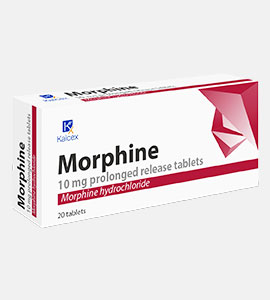What is morphine?
Morphine is an opioid medication. An opioid is sometimes called a narcotic.
Morphine is used to treat moderate to severe pain. Short-acting formulations are taken as needed for pain.
The extended-release form of morphine is for around-the-clock treatment of pain. This form of morphine is not for use on an as-needed basis for pain.
Important Information
You should not take morphine if you have severe asthma or breathing problems, a blockage in your stomach or intestines, or a bowel obstruction called paralytic ileus.
Morphine can slow or stop your breathing, and maybe habit-forming MISUSE OF OPIOID MEDICINE CAN CAUSE ADDICTION, OVERDOSE, OR DEATH, , especially in a child or other person using the medicine without a prescription. Keep the medication in a place where others cannot get to it.
Taking opioid medicine during pregnancy may cause life-threatening withdrawal symptoms in the newborn.
Fatal side effects can occur if you use opioid medicine with alcohol, or with other drugs that cause drowsiness or slow your breathing.
Before taking this medicine
You should not take this medicine if you have ever had an allergic reaction to morphine or other narcotic medicines, or if you have:
• severe asthma or breathing problems; or
• a blockage in your stomach or intestines.
Do not use morphine if you have used an MAO inhibitor in the past 14 days. A dangerous drug interaction could occur. MAO inhibitors include isocarboxazid, linezolid, methylene blue injection, phenelzine, rasagiline, selegiline, tranylcypromine, and others.
To make sure morphine is safe for you, tell your doctor if you have ever had:
• a head injury, brain tumour, or seizures;
• breathing problems, sleep apnea;
• a drug or alcohol addiction, or mental illness;
• urination problems;
• liver or kidney disease; or
• problems with your gallbladder, pancreas, or thyroid.
If you use opioid medicine while you are pregnant, your baby could become dependent on the drug. This can cause life-threatening withdrawal symptoms in the baby after it is born. Babies born dependent on opioids may need medical treatment for several weeks.
Do not breast-feed while taking morphine. This medicine can pass into breast milk and cause drowsiness, breathing problems, or death in a nursing baby.
How should I use morphine?
Take morphine exactly as prescribed by your doctor. Follow the directions on your prescription label and read all medication guides. Never use morphine in larger amounts, or for longer than prescribed. Tell your doctor if you feel an increased urge to take more of this medicine.
Never share opioid medicine with another person, especially someone with a history of drug abuse or addiction. MISUSE CAN CAUSE ADDICTION, OVERDOSE, OR DEATH. Keep the medication in a place where others cannot get to it. Selling or giving away opioid medicine is against the law.
Stop taking all other around-the-clock narcotic pain medications when you start taking morphine.
Swallow the capsule or tablet whole to avoid exposure to a potentially fatal overdose. Do not crush, chew, break, open, or dissolve.
Do not stop using morphine suddenly, or you could have unpleasant withdrawal symptoms. Ask your doctor how to safely stop using this medicine.
Never crush or break a tablet or capsule to inhale the powder or mix it into a liquid to inject the drug into your vein. This practise has resulted in death with the misuse of morphine and similar prescription drugs.
Store at room temperature, away from heat, moisture, and light. Keep track of your medicine. You should be aware if anyone is using it improperly or without a prescription.
Do not keep leftover opioid medication. Just one dose can cause death in someone using this medicine accidentally or improperly. Ask your pharmacist where to locate a drug take-back disposal program. If there is no take-back program, flush the unused medicine down the toilet.
What happens if I miss a dose?
Morphine is sometimes taken only once per day, and sometimes 2 or 3 times per day. Since this medicine is used for pain, you are not likely to miss a dose. If you do miss a dose, take the medicine as soon as you remember. Then take your next dose as follows:
• If you take morphine 3 times per day: Take your next dose 8 hours after taking the missed dose.
• If you take morphine 2 times per day: Take your next dose 12 hours after taking the missed dose.
• If you take morphine 1 time per day: Take your next dose 24 hours after taking the missed dose.
Do not take two doses at one time. Do not take more than your prescribed dose in a 24-hour period.
Morphine side effects
Get emergency medical help if you have signs of an allergic reaction to morphine: hives; difficult breat
Opioid medicine can slow or stop your breathing, and death may occur. A person caring for you should seek emergency medical attention if you have slow breathing with long pauses, blue coloured lips, or if you are hard to wake up.
Call your doctor at once if you have:
• slow heart rate, sighing, weak or shallow breathing, breathing that stops during sleep;
• chest pain, fast or pounding heartbeats;
• extreme drowsiness, feeling like you might pass out; or
• nausea, vomiting, loss of appetite, dizziness, worsening tiredness or weakness.
Common morphine side effects may include:
• drowsiness, dizziness, tiredness;
• constipation, stomach pain, nausea, vomiting;
• sweating; or
• feelings of extreme happiness or sadness.


 English
English
 العربية
العربية
 Français
Français
 Italiano
Italiano
 Čeština
Čeština
 Deutsch
Deutsch
 Español
Español
 NOK
NOK



















